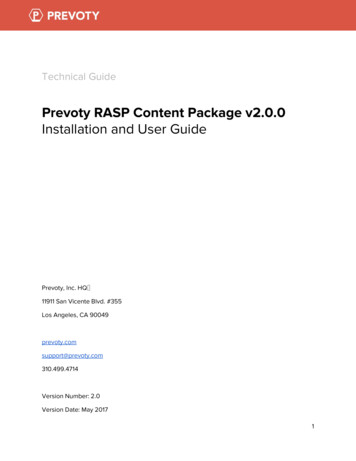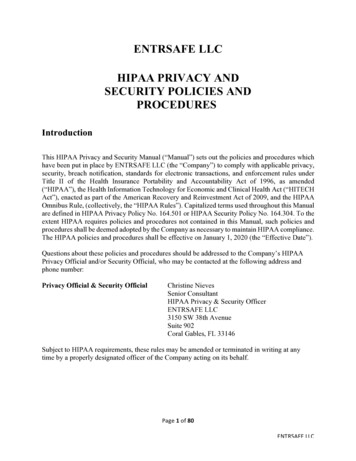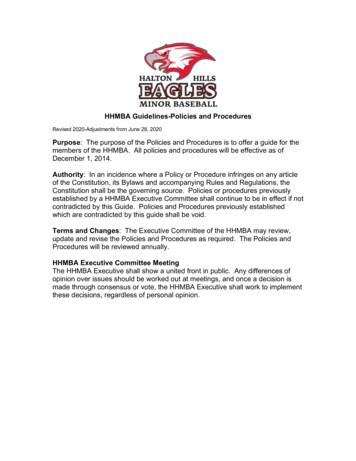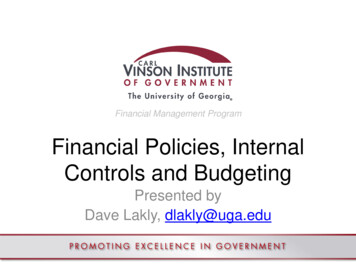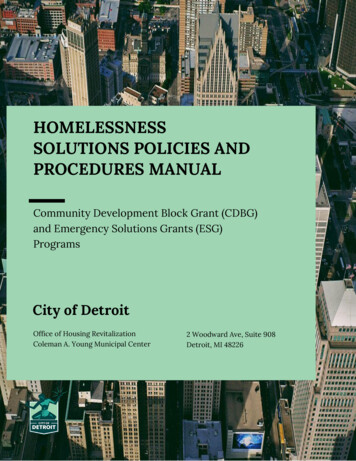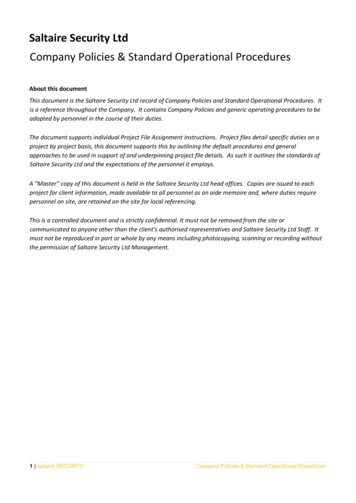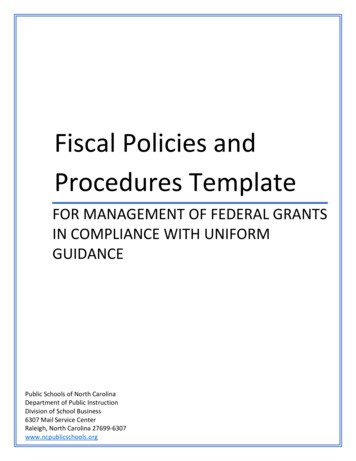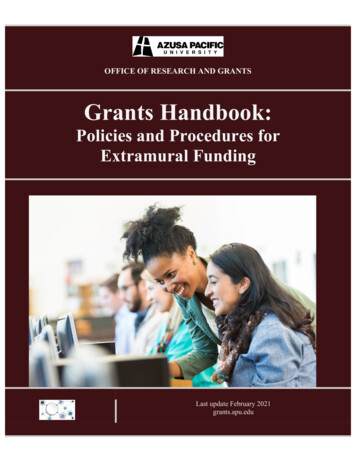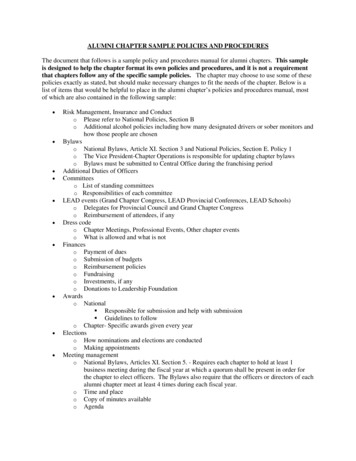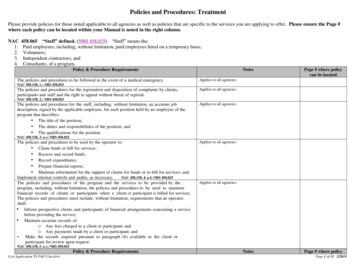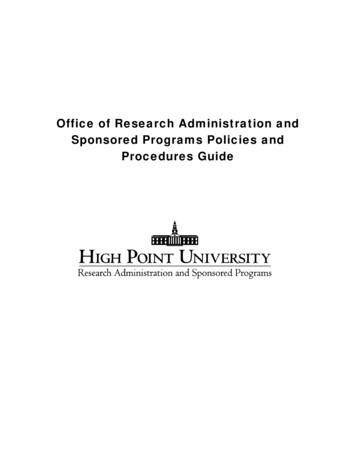
Transcription
Office of Research Administration andSponsored Programs Policies andProcedures Guide
Office of Research Administration and Sponsored ProgramsPolicies and Procedures GuideTABLE OF CONTENTSContents1. RASP Vision and Mission . 42. HPU Policies . 43. HPU Organizational Charts and Faculty Handbooks. 54. RASP’s Commitment to Training . 65. Code of Conduct . 66. Gift Vs. Grant/Contract . 67. Policy and Standard Operating Procedure For Proposal Processing . 68. Role of the Compliance Committees in the Review of Proposals . 99. Intellectual Property. 910. Who Can Submit Proposals/Applications? . 911. Types of Proposals/Applications . 912. Funding Opportunities Resources . 1113. Developing and Justifying Proposal Budgets . 1214. When Can Work Begin on A Sponosored Project? . 1415. Authorized Organizational Representative . 1516. Research Agreements: Negotiations . 1517. Office of Technology Transfer . 1618. Conflict of Interest . 1619. Budgeting . 2320. Allowable Costs . 242RASP Policies and Procedures GuideLast 10/17
21. Direct Costs . 2722. Facilities and Administrative Costs . 3023. Cost Sharing . 3124. Deposits . 3725. Establishng A Sponsored Award Account . 3826. Fixed Price Projects . 3827. Effort Certification . 3928. Equipment Acquisition and Management . 4129. Program Income . 4330. Payroll Redistributions . 4431. Transfer and Adjustments . 4532. Modifications . 4633. Budget Overdrafts . 4834. Travel . 4935. Closeout . 4936. Gift Cards . 5037. Research Misconduct . 5138. Federal Award/Pass Through Purchasing Policy . 5139. Subrecipient Monitoring and Management . 73Appendix A . 75Appendix B . 773RASP Policies and Procedures GuideLast 10/17
1. RASP VISION AND MISSIONThe Office of Research Administration and Sponsored Programs (RASP) is committed togrowing research in a manner that reflects the goals of the High Point University’sstrategic efforts. Below is RASP’s articulation of that commitment.Vision: To advocate for and positively affect the HPU research endeavor, with a focus ongrowing Teacher-Scholars.Mission: To facilitate the HPU research enterprise and provide superior service for allresearch stakeholders including, faculty, staff, students, sponsors and communitypartners.Priorities:1. Foster a research enterprise that enhances the academic standing of the HPU.2. Enhance faculty and student research opportunities.3. Support HPU efforts to grow institutional research infrastructure and capacity.4. Coordinate administrative efforts with other HPU operational units.5. Cultivate important strategic partnerships.6. Ensure HPU compliance with federal, state, and local laws and regulations.2. HPU POLICIESHPU policies and procedures that are outside the scope of RASP, which are referencedin this document, may be accessed through the HPU Blackboard e-portal athttps://mycourses.highpoint.edu/.4RASP Policies and Procedures GuideLast 10/17
3. HPU ORGANIZATIONAL CHARTS AND FACULTY HANDBOOKSAs of 2/16/155RASP Policies and Procedures GuideLast 10/17
4. RASP’S COMMITMENT TO TRAININGRASP is committed to providing training in sponsored programs administration bestpractices and related topics. Should you or your unit desire additional trainingopportunities, please contact RASP at rasp@highpoint.edu.5. CODE OF CONDUCTThose involved in academic research must guard the truth and protect the publictrust. HPU seeks to create and preserve an environment in which research canthrive. Research compliance is a shared responsibility of every member of the HPUcommunity, each of whom must be dedicated to maintaining the highest ethicalstandards.6. GIFT VS. GRANT/CONTRACTHPU receives both gifts and grants from external sources. However, gifts and grants aretreated differently in terms of accounting and management.Gift:A voluntary and irrevocable transfer of money, services, or property givenfrom an external source without any expectation of a return benefit fromHPU. Gifts are handled by the Office of Institutional Advancement.Grant: An agreement that transfers money, services, or property in exchange fora set of specific services and deliverables to an external source during aset period of time. This definition of a grant includes contracts,subcontracts, subawards, etc. Funding from a governmental source isnever a gift. Grants are handled by RASP.7. POLICY AND STANDARD OPERATING PROCEDURE FORPROPOSAL PROCESSINGI.Policy:Sponsored research proposals shall be reviewed and approved byDepartment Chairs, Deans, and the RASP Director. The RASP Director isthe HPU Authorized Organizational Representative (AOR). All proposalsmust have AOR for the proposal to be binding upon HPU.II.Roles and Responsibilities6RASP Policies and Procedures GuideLast 10/17
a. Principal Investigator: To prepare proposals in accordance with RASP,Department, and College/School guidelines and disclose all conflicts ofinterest.b. Department Chair: To review and approve a Principal Investigators’proposal within his/her department. Considerations include:1. Does the proposed project fit with the department mission?2. Is the faculty member able to complete this project at the level ofdefined effort given his or her other HPU obligations?3. Are there sufficient resources to carry out the proposal? This reviewincludes resources currently available at HPU and any equipment ormaterials and supplies purchased during the project.4. Does this proposal need review by HPU’s compliance committees?5. Is any proposed cost share acceptable and are these fundsavailable during the proposed period of performance?c. Dean: To review and approve a Principal Investigators’ proposal withinhis/her college or school. Considerations include:1. Does this proposed project fit with the College/School’smission(s)?2. Are the cost sharing commitments made by the Department appropriateand acceptable?3. Does the budget fully reflect the costs necessary to successfully performon the project?d. RASP: To review and institutionally approve proposals. Considerationsinclude:1. Have all non-compliance committee compliance-related issues beenaddressed (i.e. export control, etc.)?2. Is the budget complete and accurate?3. Have all institutional approvals been received?4. Have all conflicts of interest identified and managed?e. Compliance Chairs: To review and approve all proposals that fall withintheir purview (Institutional Review Board, Institutional Animal Care and UseCommittee, Institutional Biosafety Committee)III. Proposal Types:a. Federal: Federal proposals may be proposed and managed using Cayuse424.b. Non-Federal: Non-federal proposals may be routed and managed throughemail.IV. Procedure:a. A Principal Investigator will complete his/her proposal and route it to RASPfor initial review.b. Following RASP receipt and review, RASP will address any questions andsend the proposal to the Principal Investigator’s department chair and dean forapproval.7RASP Policies and Procedures GuideLast 10/17
c. RASP must receive a fully routed proposal no later than five days beforethe Request For Proposals (RFP) submission date. Proposals receivedless than five days before the submission date may adversely impactRASP’s review quality.d. Unless otherwise provided for in the RFP, compliance committeeapprovals are not required before proposal submission. However, a projectmay not start, even if an award is made, until all applicable compliancecommittees grant their express written approval of the associatedprotocol/application.e. After RASP final review and approval, the proposal may be submitted byRASP or as otherwise requested by the Principal Investigator.f. RASP will log all proposals into the Research Administration Database(RAD).VII. Limited Submissiona. When a RFP limits the number of institutional submissions, the followingguidelines are to be followed:1. Interested faculty are encouraged to submit a brief pre-proposal viaemail to the RASP Director, with copies to their Department Chairand Dean within 60 days of the RFP deadline.2. If fewer than the allowed number of pre-proposal applications arereceived, the normal process for proposal processing shall befollowed.3. If more than the allowed number of pre-proposal applications arereceived, the following process will be implemented:i. Pre-proposal applications will be reviewed on merit.However, if multiple eligible applicants are within onedivision, the dean of that division will rank the applicationson behalf of that division. This doesn’t preclude multipleapplications from within the unit.ii.An ad-hoc committee composed of no less than three facultydesignated by the Vice President for Research and Planningwill be constituted to review and rank the pre-proposals. Thecommittee will review the re- proposals and make arecommendation to the Provost within a two-week timeframe.iii.The RASP Director will notify the faculty and appropriateofficials (deans, department chairs, etc.) as to which proposalsare to be submitted on behalf of HPU.8RASP Policies and Procedures GuideLast 10/17
8. ROLE OF THE COMPLIANCE COMMITTEES IN THE REVIEW OFPROPOSALSThree compliance committees are responsible for ensuring the safety and well-being forcertain groups or materials.I.II.III.Institutional Review Board (IRB):The IRB is charged with ensuring the safety and well-being of human subjectsengaged in the course of research.Institutional Animal Care and Use Committee (IACUC):The IACUC is charged with ensuring the safety and well-being of animals used inresearch.Institutional Biosafety Committee (IBC):The IBC is charged with ensuring the safe use and practices with recombinantDNA, genetically modified plants/animals, pathogens/select agents, toxins, certainarthropods, and human or non-human primate body fluids, cell lines, or tissues.9. INTELLECTUAL PROPERTYHPU is committed to encouraging the entrepreneurship of its faculty, staff and studentsthrough the responsible administration of its intellectual property policy. Pleasereference the current faculty handbook found on Blackboard under “IntellectualProperty.” If you are a student or a staff member, please contact RASP atrasp@highpoint.edu for a copy of HPU’s intellectual property policy.10. WHO CAN SUBMIT PROPOSALS/APPLICATIONS?Tenure-track faculty are authorized to submit sponsored program proposals. All otherfaculty and staff wishing to submit proposals must obtain their department chair (foracademic departments) or supervisor’s (non-academic departments) approval. TheRASP Director shall document approvals and store it in the corresponding proposalrecord.11. TYPES OF PROPOSALS/APPLICATIONSIn general, proposal submissions for federal awards will fall into one of the following types(please note that many foundations will use similar terminology):Pre-application or Preliminary Proposal: A pre-application establishes communicationbetween the sponsor and the applicant to determine whether a full proposal should besubmitted and to obtain advice that will improve the proposal's chance of success.New: A new proposal application is one that has not been previously funded by thesponsor.9RASP Policies and Procedures GuideLast 10/17
Competing: Considered to be a new proposal by the sponsor to continue the researchthe sponsor has previously funded.Continuation: Continuation applications are for continued support on current projectsthat the sponsor anticipates funding.Supplemental: Submitted to the sponsor when requesting additional funds for an existingproject.Revised New or Revised Renewal: If a proposal has been rejected or revisionsrequested by the sponsor, the PI often has an opportunity to use the reviewer's commentsto revise the proposal for resubmission. Changes should be marked or italicized. Thesponsor's program officer should be contacted for application guidelines. Many federalagencies have application kits in electronic format that can be downloaded from the web.Checking the sponsor’s requirements regarding the completion of a proposal is essentialprior to the development of the proposal.PIs submitting proposals to state and local agencies, private organizations, associations,and industry sponsors are encouraged to contact these sponsors for program guidelines.Help in Proposal WritingDepartmental colleagues, particularly the department chair, may be the most helpfulresource for sample proposals and help on proposal writing.Proposal Review Process by the SponsorIn general, a team of experts or prominent researchers in the particular field of study willreview the proposal for its technical content and cost. Although selection of thesereviewers lies fully within the sponsor's authority, some sponsors may allow the PI tosuggest individuals well qualified to review their proposal. The PI may also be permittedto list those who should not be part of the review process.RejectionsSponsors typically receive more applications than can be funded. To be competitive, eachproposal must be prepared in accordance with sponsor guidelines.Many sponsors provide explanatory information with their letters of notification. Thisinformation often includes the process by which the proposal was reviewed, the numberof proposals and awards, and information about budget availability. Copies of proposalreviews may also be supplied. Contact the program officer or sponsor for furtherinformation.Appeals10RASP Policies and Procedures GuideLast 10/17
Some sponsors may have an appeal process if an applicant feels that the proposal'shandling or peer review has been inappropriate. Check the sponsor's guidelines forfurther information. The appeal process may take several months to complete, thereforeit may be more effective to use the reviewers' comments to revise and resubmit theproposal.12. FUNDING OPPORTUNITIES RESOURCESIdentifying organizations that have a vested interest in your field of research is essentialto obtaining funding for your idea. From federal, state, private, and internal sources,locating funding opportunities is simplified using Pivot and the other grant portals ://www.highpoint.edu/rasp/resources/.PIVOTPivot is a research prospect finder with over 33 billion dollars in funding opportunities.HPU’s subscription to Pivot allows any faculty, staff, or student to access the resourcethrough a HPU computer or remote connection. Users can create a custom profile andPivot delivers the results via email. Pivot also provides users the opportunity to findcollaborators.Grants.govGrants.gov is the central depository for the Federal Government’s grant programs. Over1000 grant opportunities are available.National Science FoundationThe National Science Foundation (NSF) is the federal agency dedicated to promotingscience. NSF is the major source of federal funding in mathematics, computer science,and the social sciences.National Institutes of HealthThe Nationals Institutes of Health (NIH) is a part of the United States Department ofHealth and Human Services. Comprised of twenty-seven centers and institutes, NIH isthe largest source of medical funding in the world.National Endowment for the HumanitiesThe National Endowment for the Humanities (NEH) is an independent federal agency thatsupports works in the humanities. NEH grants support humanities-based teaching andlearning, research and scholarship,National Endowment for the ArtsThe National Endowments for the Arts is an independent federal agency. The NEA isthe largest funder of the arts in the United States. Grant supported programs includeperformances, exhibitions, festivals, and artist residencies.11RASP Policies and Procedures GuideLast 10/17
The Foundation CenterThe Foundation Center offers philanthropic analysis, data, and training to organizationsseeking funding through various foundations. You may search for foundations free ofcharge.13. DEVELOPING AND JUSTIFYING PROPOSAL BUDGETSAll costs proposed on sponsored project must be allowable under Title 2, Subtitle A,Chapter II, Part 200 – Uniform Administrative Requirements, Cost Principles, and AuditRequirements for Federal Awards, Subpart E (formerly known as the Office ofManagement and Budget Circular A-21, Cost Principles for EducationalInstitutions). Allowable costs are those costs that are reasonable, allocable, treatedconsistently, and that conform to specific programmatic limitations. In rare instances, anexception to these requirements can be made. These exceptions are called “UnlikeCircumstances”. An example of an Unlike Circumstance exception is if a project seeksto test inebriated drivers’ response times. Alcohol is prohibited under SubpartE. However, alcohol would be allowed due to its direct application in the study. Costsand their allowance are described in detail in Subpart E. Please contact RASP if youbelieve that your project meets an Unlike Circumstance exception.SALARIESSalary for faculty and other personnel are estimated using the percentage of theindividual’s annual salary, regardless of whether the individual is on a nine, ten, eleven,or twelve month contract. For example, if a faculty member earns 50,000 a year andwill expend ten percent of his annual effort on a project, the resulting salary would be 5,000. Under no circumstances should salary be budgeted as an hourly rate. If hourlyrates are requested, please contact the RASP before moving forward. If you choose toadd your salary in Cayuse 424, the software will automatically calculate your projectsalary amount by the percent of effort or monthly effort. When given the opportunity,please include a salary escalation rate of two percent for all proposal out years. You canautomatically escalate out years in Cayuse 424 by clicking on the stairs icon.FRINGEThe fringe rate for all HPU employees is twenty-three (23%) percent of the project salaryduring the academic and calendar years and ten (10%) percent during summerperiods. For example, if a faculty member budgets 5,000 in salary on an academic yearproject, the resulting fringe charge would be twenty-four percent of 5,000 or 1,200. Cayuse 424 will automatically add the correct fringe amount to any salary.TRAVELAll costs budgeted and incurred must be in furtherance of the sponsored project. Air fare,car rental, hotel, conference fees, etc. should be based on actual costs or estimates froma reputable travel agency or similar service, such as Expedia. Flights should be economybased. Federal awards require using United States-based carriers when possible. If aHPU vehicle is used, please contact Transportation at 9113 for an estimate of12RASP Policies and Procedures GuideLast 10/17
charges. Use of a personal vehicle will be reimbursed at the rate in effect, as providedby the HPU Business Office, at the time of incurrence. When given the opportunity, pleaseinclude a two percent escalation rate for all proposal out years.PARTICIPANT SUPPORT COSTSParticipant Support Costs are those costs paid to or for participants in connection with theHPU hosting of an event, meeting, or conference, etc., under a sponsoredproject. Applicable costs include but are not limited to event fees, food, and travel. Somesponsors, such as the National Science Foundation have specific conditions associatedwith this category.EQUIPMENTEquipment is defined as any item that is 5,000 or greater and has more than one yearof useful life. This includes equipment that is fabricated at HPU wherein the componentcosts are greater than 5,000.COMPUTERSComputers are a special budgeting case in sponsored research. Because computers areused for many efforts including email, web browsing, and database management, it israre that they are used to solely support a sponsored project. As such, computers shouldnot be wholly budgeted on a sponsored project unless that computer is connected to apiece of equipment or other device and is only used to run that piece ofequipment. Computers cost should be prorated based on the percentage of work that isto be done on the project on that computer. General computers are included in HPU’sindirect cost rate. Any project in which a computer is proposed to be charged at onehundred percent must be approved by the Director of Research Administration andSponsored Programs prior to submission.MATERIALS AND SUPPLIESMaterials and supplies should be budgeted using quotes or costs from similar items thatwere recently purchased. If HPU is buying components to assemble into a piece offabricated equipment, those costs should be placed in the equipment line. General officesupplies may not be purchased without RASP prior approval, as these costs areconsidered as a part of HPU’s indirect cost rate.SUBAWARDS AND CONSULTANTSSubawards and Consultants are non-HPU participants that support a HPU sponsoredproject. Both are similar in that each supports the efforts of a HPU sponsored project;however, it’s how each contributes to the project that determines which category to use.Subawards must be issued through the Office of Research Administration and SponsoredPrograms, while Consultant actions are issued through HPU Purchasing.Subawards are those non-HPU project participants that: Have their performance measured against whether the project objectives are met Have responsibility for programmatic decision-making Uses the project funding to carry out a program of the organization13RASP Policies and Procedures GuideLast 10/17
Are subject to the project compliance requirementsFor example, a partnering HPU may be responsible for a programmatic element such asdeveloping a new algorithm for modeling bird flight.Consultants are those non-HPU project participants that: Provide goods and services as part of their normal business operations Provide similar goods to many different purchasers Operates in a competitive environment Provides goods or services that are ancillary to the project Are not subject to the project compliance requirementsFor example, a company may provide survey services on a leadership study.Subawards may be entered into Cayuse 424 by hand, by uploading the Adobe SF 424budget file, or through Cayuse’s web site subawards.com or by hand/spreadsheet.OTHER DIRECT COSTSOther Direct Costs encompass those costs that can be directly attributed to the projectand that do not fit into other budget lines. Examples of Other Direct Costs includemaintenance, freight, warranties, etc.INDIRECT COSTSIndirect Costs are those costs that cannot be directly attributed to a project. The costsare generally known as Facilities & Administrative (F&A) costs. Indirect costs includeelectricity, water, sewer, library, research administration salary, and other generalresearch support costs. For collection of indirect costs, institutions should have afederally negotiated indirect cost rate agreement. HPU’s current F&A rate anddocumentation can be found at http://ww.highpoint.edu/rasp/apply/information. Pleasecontact the RASP with any questions.COST SHAREHPU strongly recommends cost sharing only those funds that required under the programto which you are applying. All cost share must be approved by cognizant departmentheads and deans. Cost share provided by non-HPU entities must be documented in theHPU proposal on the third-party’s letterhead clearly indicating the amount of the costshare and the budgetary line where the cost share will originate, for example salaries orequipment14. WHEN CAN WORK BEGIN ON A SPONOSORED PROJECT?Work on a sponsored project can only begin after RASP officially accepts the award.Faculty members are not authorized to sign sponsored programs awards on behalf ofHPU. RASP shall negotiate and/or approve of all award terms. Additionally, RASP willnot internally award a project until HPU’s compliance committees approve any relatedprotocol. Once RASP accepts an award, it will prepare an award package, including anotice of award, principal investigator responsibility letter, complete terms and conditions,statement of work, and matching budget. RASP will transmit an electronic copy to the14RASP Policies and Procedures GuideLast 10/17
principal investigator, his/her department chair and dean, and the Office of BusinessAffairs.In certain circumstances, a project may start before the official start date. The principalinvestigator may request a pre-award account from RASP. RASP will not approve a preaward account without documentation from the sponsor that it: 1) intends to provide anaward and 2) will cover costs during the pre-award period. Any costs that aresubsequently disallowed will be the responsibility of the principal investigator’sdepartment or college/school. The department must provide an account from which anycost overruns will covered at the time of the pre-award request.15. AUTHORIZED ORGANIZATIONAL REPRESENTATIVEThe RASP Director is authorized by the HPU President, as resolved by the HPU Boardof Trustees, to sign proposals and contracts, including grants and cooperativeagreements, for research, public service, scholarship, and other creative sponsoredactivities. Until such time that HPU institutes a separate technology transfer program, theRASP Director has the authority to sign contracts necessary for the operation oftechnology transfer program, including but not limited to licenses, options, confidentialityagreements, material transfer agreements and documents required for the prosecutionand maintenance of HPU intellectual property rights. The RASP Director’s signatureauthority letter may be found at 6. RESEARCH AGREEMENTS: NEGOTIATIONSRASP is responsible for managing all contractual negotiations for sponsored projects.RASP will coordinate negotiations with investigators, deans and department chairs, andother offices as appropriate.Investigators and administrators should contact RASP immediately if a sponsorrepresentative calls to negotiate terms of the project. Failure to do so may result in RASPhaving to re-open negotiation on points the sponsor believed to be settled.Negotiation issues include:1. The technical plan, or scope of work;2. Scientific control and direction of project;3. Key personnel;4. Period of performance;5. Confidentiality of data and access to patient records;6. Publication rights;7. Ownership and disposition of intellectual property;8. Financial Issues: Sponsor commitment, cost sharing, F&A costs, allowable costs,program income, record retention and audit procedures;15RASP Policies and Procedures GuideLast 10/17
9. Deliverables and reports;10. Invoices and
7 RASP Policies and Procedures Guide Last 10/17 a. Principal Investigator: To prepare proposals in accordance with RASP, Department, and College/School guidelines and disclose all conflicts of
